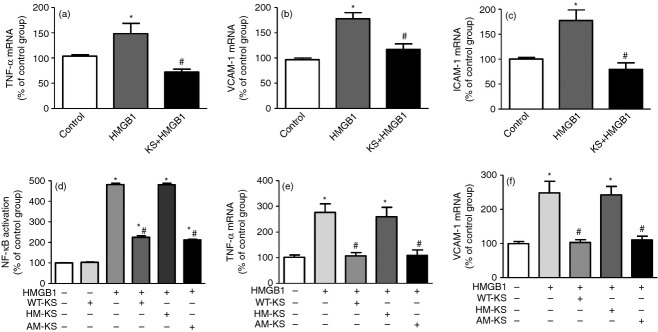Figure 5.

Kallistatin inhibits recombinant human high mobility group box-1 (HMGB1) -induced nuclear factor-κB (NF-κB) activation and inflammatory gene expression via its heparin-binding site in human endothelial cells. Endothelial cells were incubated with or without kallistatin (0·5 μm) for 30 min and then stimulated with HMGB1 (400 ng/ml) for another 24 hr. Kallistatin treatment significantly decreased HMGB1-induced (a) tumour necrosis factor-α (TNF-α), (b) vascular cell adhesion molecule 1 (VCAM-1) and (c) intercellular adhesion molecule 1 (ICAM-1) expression (n = 6). In subsequent studies, endothelial cells were incubated with wild-type kallistatin (WT-KS; 2 μm), heparin-mutant kallistatin (HM-KS; 2 μm) or active site-mutant kallistatin (AM-KS; 2 μm) for 30 min, and then stimulated with HMGB1 (1 μg/ml for another 16 hr or 400 ng/ml for another 24 hr). The wild-type or active site-mutant kallistatin, but not the heparin-mutant kallistatin, significantly inhibited HMGB1-induced (d) NF-κB activation, (e) TNF-α and (f) VCAM-1 expression (n = 3 to n = 4). Data are expressed as means ± standard error of the mean (SE) from two independent experiments. * P < 0·05 compared with the control group. # P < 0·05 compared with the HMGB1 alone group.
